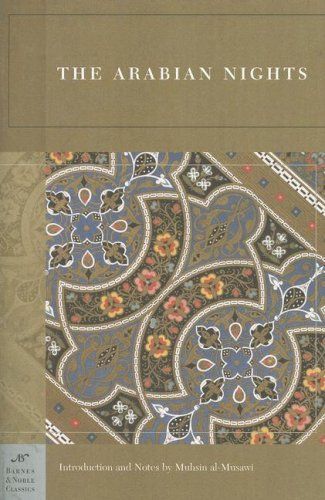
Arabian Nights
The Arabian Nights, by Anonymous, is part of the Barnes & Noble Classics series, which offers quality editions at affordable prices to the student and the general reader, including new scholarship, thoughtful design, and pages of carefully crafted extras. Here are some of the remarkable features of Barnes & Noble Classics: New introductions commissioned from today's top writers and scholars Biographies of the authors Chronologies of contemporary historical, biographical, and cultural events Footnotes and endnotes Selective discussions of imitations, parodies, poems, books, plays, paintings, operas, statuary, and films inspired by the work Comments by other famous authors Study questions to challenge the reader's viewpoints and expectations Bibliographies for further reading Indices & Glossaries, when appropriate All editions are beautifully designed and are printed to superior specifications; some include illustrations of historical interest. Barnes & Noble Classics pulls together a constellation of influences—biographical, historical, and literary—to enrich each reader's understanding of these enduring works. Once upon a time, the name Baghdad conjured up visions of the most magical, romantic city on earth, where flying carpets carried noble thieves off on wonderful adventures, and vicious viziers and beautiful princesses mingled with wily peasants and powerful genies. This is the world of the Arabian Nights, a magnificent collection of ancient tales from Arabia, India, and Persia. The tales—often stories within stories—are told by the sultana Scheherazade, who relates them as entertainments for her jealous and murderous husband, hoping to keep him amused and herself alive. In addition to the more fantastic tales which have appeared in countless bowdlerized editions for children and have been popularized by an entire genre of Hollywood films, this collection includes far more complex, meaningful, and erotic stories that deal with a wide range of moral, social, and political issues. Though early Islamic critics condemned the tales’ “vulgarity” and worldliness, the West has admired their robust, bawdy humor and endless inventiveness since the first translations appeared in Europe in the eighteenth century. Today these stories stand alongside the fables of Aesop, the fairy tales of the Brothers Grimm, and the folklore of Hans Christian Andersen as some of the Western literary tradition’s most-quoted touchstones. Muhsin J. Al-Musawi is Professor of Arabic Studies at Columbia University in New York City and University Professor at the American University of Sharjah. He is the editor of the Journal of Arabic Literature and the author of twenty-seven books in Arabic and English. He was the recipient in 2002 of the Owais Award in literary criticism, the most prestigious nongovernmental literary award in the Arab World.
Reviews
Celina Gacias@shellkyle